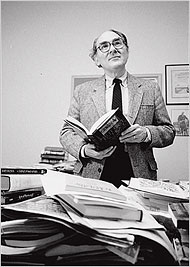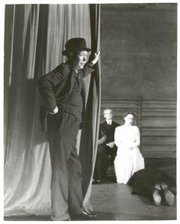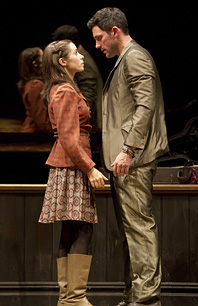“To write a successful scene, one must stringently apply and stringently answer the following three questions:
“1. Who wants what from whom?
“2. What happens if they don’t get it?
“3. Why now?”
David Mamet, Bambi vs. Godzilla: On the Nature, Purpose, and Practice of the Movie Business

 Hilton Kramer, who died today after a long and debilitating illness, was a great art critic who also founded an important magazine,
Hilton Kramer, who died today after a long and debilitating illness, was a great art critic who also founded an important magazine,  From 2005:
From 2005: My brother and sister-in-law are moving into my mother’s house in Smalltown, U.S.A. It was built a half-century ago and is in need of much repair, so Dave has set about remodeling the place, starting with what used to be my bedroom. Though he undertook the task with my wholehearted approval, it was still a jolt when I stopped by the house, opened the door to my old room, and found…nothing. The bed I’d slept in, the bookshelf that once held my burgeoning library of paperbacks, the chest of drawers in which I placed my neatly folded clothes–all had vanished. Even the carpet was gone.
My brother and sister-in-law are moving into my mother’s house in Smalltown, U.S.A. It was built a half-century ago and is in need of much repair, so Dave has set about remodeling the place, starting with what used to be my bedroom. Though he undertook the task with my wholehearted approval, it was still a jolt when I stopped by the house, opened the door to my old room, and found…nothing. The bed I’d slept in, the bookshelf that once held my burgeoning library of paperbacks, the chest of drawers in which I placed my neatly folded clothes–all had vanished. Even the carpet was gone. Not surprisingly, opening the door to my bare room-that-once-was put me in mind of the last act of Our Town, in which the Stage Manager permits Emily to pay a spectral visit to the Grover’s Corners of her childhood. It felt as though I had turned that scene upside down, with the Stage Manager pulling back the curtain to reveal an empty stage.
Not surprisingly, opening the door to my bare room-that-once-was put me in mind of the last act of Our Town, in which the Stage Manager permits Emily to pay a spectral visit to the Grover’s Corners of her childhood. It felt as though I had turned that scene upside down, with the Stage Manager pulling back the curtain to reveal an empty stage. Never mind all that. Go anyway.
Never mind all that. Go anyway.